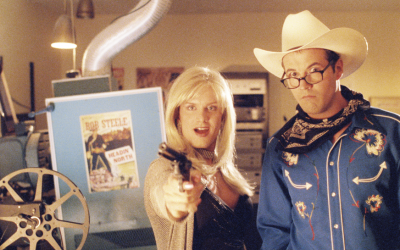Source: Deadline
For the longest time – more specifically, these past couple months – it looked like Jane Campion’s Western drama “The Power of the Dog” would be without question the big winner at this year’s upcoming Academy Awards. Its fortunes kicked off with a win for Best Motion Picture – Drama and Best Director for Campion, and its award count has only gotten larger in the weeks since, pulling off major wins at such ceremonies as the BAFTAs and the Critics Choice Awards. Considering everything that has happened so far, one would think that the Best Picture Oscar is the film’s to lose. However, if history has taught anything, it’s that surprises can happen even in the most seemingly predictable of circumstances, and if one were to pay close enough attention, a potential underdog has begun to rise up in the ranks and could possibly pull off a major upset. That film: Sian Heder’s coming-of-age drama “CODA”.
“CODA”, which revolves around the family of deaf parents (the title itself is an acronym for “child of deaf adults”, certainly has an interesting release history compared to other Oscar contenders. Its premiere took place in January 2021 at the Sundance Film Festival, much earlier than the mid-autumn release dates that most nominated films tend to release. Not long after its premiere, Apple acquired the distribution rights to the film for $25 million, more than any other film in Sundance history. Despite the achievement, its placement on Apple TV+ definitely put “CODA” at a disadvantage; streaming films in general have had a tough time breaking out at the Oscars (despite several nominations, not one has won Best Picture as of yet), and Apple TV+’s status as a less popular service (at least compared to Netflix or Disney+) certainly doesn’t help matters much. Judging by these circumstances, “CODA” should theoretically have the lowest chances of winning among the Best Picture nominees. However, like most underdogs, signs that the odds are perhaps a bit higher than anticipated have been appearing at an increasingly frequent rate.
The first major instance of “CODA” coming out on top when it was least expected to do so came at the Screen Actors Guild Awards, which took place near the end of February. Not only was actor Troy Kotsur awarded Outstanding Performance by a Male Actor in a Supporting Role for his work in the film (making him the first disabled actor to make such an achievement), but the cast as a whole ended up winning Outstanding Performance by a Cast in a Motion Picture, beating out favorites such as “Belfast” and “Don’t Look Up”. Granted, in recent years, this award has not correlated with the eventual Best Picture winner all that often, but the surprise win did draw a lot of attention towards “CODA” and may have in fact influenced some of the awards it would acquire shortly afterwards.
It was just the weekend before the Oscars that “CODA” cemented itself as a serious contender for the Best Picture category, as award ceremonies for two major Hollywood guilds ended up giving the film its highest honors. The first of these was the award for Outstanding Producer of Theatrical Motion Pictures at the Producers Guild of America Awards, held on March 19th, to which the award went to producers Fabrice Gianfermi, Phillipe Rousselet, and Patrick Wachsberger. Nine other films – “Being the Ricardos”, “Belfast”, “Don’t Look Up”, “Dune”, “King Richard”, “Licorice Pizza”, “The Power of the Dog”, “Tick, Tick… Boom!”, and “West Side Story” – competed for the award, many of which are also nominated for the Academy Award for Best Picture. Recent years have shown that the PGAs have been a bit hit and miss when it comes to correlating with the Oscars – some years they’ve lined up perfectly, others they haven’t – but if nothing else, “CODA” winning the PGA’s biggest award does show that it does indeed have a major chance at winning the Oscar.
The following day, “CODA” found another major success at the Writers Guild of American Awards, winning one of two of the organization’s major film awards, Best Adapted Screenplay (the other, Best Original Screenplay, went to Adam McKay and David Sirota’s “Don’t Look Up”). Other films competing for the award were the sci-fi epic “Dune”, the film noir remake “Nightmare Alley”, the musical biopic “Tick, Tick… Boom!”, and the cinematic adaptation of the iconic musical “West Side Story”, but in the end, it was “CODA” that won big at the WGAs. Although a win for a screenplay does not instantly guarantee for the film overall, there have been very few Best Picture winners that have not won an Oscar for its screenplay, and between its Best Adapted Screenplay wins at both the WGAs and the BAFTAs, “CODA” appears to be on the verge of winning this same category at the Oscars.
With all of these factors taken into consideration, could “CODA” indeed pull an upset over popular favorite “The Power of the Dog” and win Best Picture at the Academy Awards? Such an event is far from guaranteed, but one aspect of the voting process that could work to either film’s favor is the ranked choice voting process used to determine Best Picture. Unlike other categories, where voters simply pick whichever nominee they like best, Best Picture requires voters to rank each film on a numbered scale (in this year’s case, on a scale from 1 to 10), and whichever film receives the highest average ranking will be named the year’s Best Picture. Even if “CODA” isn’t given the highest rating possible by the most voters, its final tally could average out to one that ends up being higher than any other nominated film.
Then again, considering how this system of voting works, one could theoretically predict any of the Best Picture nominees to be the big winner in the end, especially considering just how polarizing many of the nominated films have been this year. Still, whatever the case may be – whether a more expected film ends up winning or a less likely underdog pulls a major upset – this year’s Best Picture race is shaping itself to be one that is far more interesting than those of the recent past. The eventual outcome will hopefully be just as interesting, but only time will tell.




